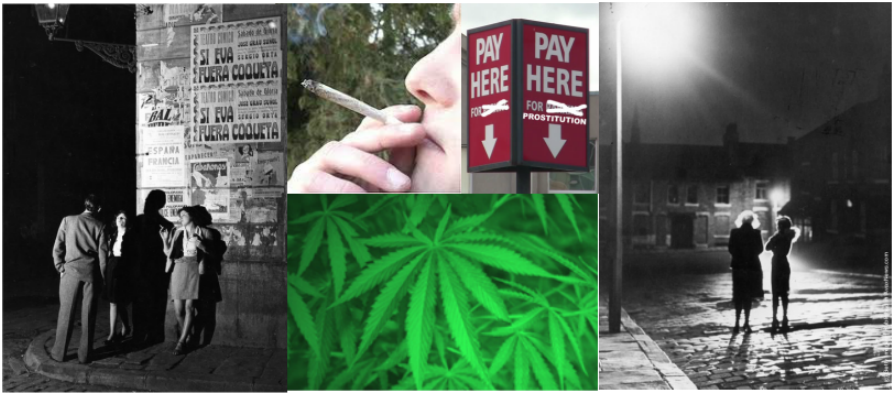- Home
- Site Index
- About Me
-
My Books
- Book List & Themes
- Strictly for Adults Novels >
-
Tales from Portlaw
>
- No Need to Look for Love
- 'The Love Quartet' >
-
The Priest's Calling Card
>
- Chapter One - The Irish Custom
- Chapter Two - Patrick Duffy's Family Background
- Chapter Three - Patrick Duffy Junior's Vocation to Priesthood
- Chapter Four - The first years of the priesthood
- Chapter Five - Father Patrick Duffy in Seattle
- Chapter Six - Father Patrick Duffy, Portlaw Priest
- Chapter Seven - Patrick Duffy Priest Power
- Chapter Eight - Patrick Duffy Groundless Gossip
- Chapter Nine - Monsignor Duffy of Portlaw
- Chapter Ten - The Portlaw Inheritance of Patrick Duffy
- Bigger and Better >
- The Oldest Woman in the World >
-
Sean and Sarah
>
- Chapter 1 - 'Return of the Prodigal Son'
- Chapter 2 - 'The early years of sweet innocence in Portlaw'
- Chapter 3 - 'The Separation'
- Chapter 4 - 'Separation and Betrayal'
- Chapter 5 - 'Portlaw to Manchester'
- Chapter 6 - 'Salford Choices'
- Chapter 7 - 'Life inside Prison'
- Chapter 8 - 'The Aylesbury Pilgrimage'
- Chapter 9 - Sean's interest in stone masonary'
- Chapter 10 - 'Sean's and Tony's Partnership'
- Chapter 11 - 'Return of the Prodigal Son'
- The Alternative Christmas Party >
-
The Life of Liam Lafferty
>
- Chapter One: ' Liam Lafferty is born'
- Chapter Two : 'The Baptism of Liam Lafferty'
- Chapter Three: 'The early years of Liam Lafferty'
- Chapter Four : Early Manhood
- Chapter Five : Ned's Secret Past
- Chapter Six : Courtship and Marriage
- Chapter Seven : Liam and Trish marry
- Chapter Eight : Farley meets Ned
- Chapter Nine : 'Ned comes clean to Farley'
- Chapter Ten : Tragedy hits the family
- Chapter Eleven : The future is brighter
-
The life and times of Joe Walsh
>
- Chapter One : 'The marriage of Margaret Mawd and Thomas Walsh’
- Chapter Two 'The birth of Joe Walsh'
- Chapter Three 'Marriage breakup and betrayal'
- Chapter Four: ' The Walsh family breakup'
- Chapter Five : ' Liverpool Lodgings'
- Chapter Six: ' Settled times are established and tested'
- Chapter Seven : 'Haworth is heaven is a place on earth'
- Chapter Eight: 'Coming out'
- Chapter Nine: Portlaw revenge
- Chapter Ten: ' The murder trial of Paddy Groggy'
- Chapter Eleven: 'New beginnings'
-
The Woman Who Hated Christmas
>
- Chapter One: 'The Christmas Enigma'
- Chapter Two: ' The Breakup of Beth's Family''
- Chapter Three: From Teenager to Adulthood.'
- Chapter Four: 'The Mills of West Yorkshire.'
- Chapter Five: 'Harrison Garner Showdown.'
- Chapter Six : 'The Christmas Dance'
- Chapter Seven : 'The ballot for Shop Steward.'
- Chapter Eight: ' Leaving the Mill'
- Chapter Ten: ' Beth buries her Ghosts'
- Chapter Eleven: Beth and Dermot start off married life in Galway.
- Chapter Twelve: The Twin Tragedy of Christmas, 1992.'
- Chapter Thirteen: 'The Christmas star returns'
- Chapter Fourteen: ' Beth's future in Portlaw'
-
The Last Dance
>
- Chapter One - ‘Nancy Swales becomes the Widow Swales’
- Chapter Two ‘The secret night life of Widow Swales’
- Chapter Three ‘Meeting Richard again’
- Chapter Four ‘Clancy’s Ballroom: March 1961’
- Chapter Five ‘The All Ireland Dancing Rounds’
- Chapter Six ‘James Mountford’
- Chapter Seven ‘The All Ireland Ballroom Latin American Dance Final.’
- Chapter Eight ‘The Final Arrives’
- Chapter Nine: 'Beth in Manchester.'
- 'Two Sisters' >
- Fourteen Days >
-
‘The Postman Always Knocks Twice’
>
- Author's Foreword
- Contents
- Chapter One
- Chapter Two
- Chapter Three
- Chapter Four
- Chapter Five
- Chapter Six
- Chapter Seven
- Chapter Eight
- Chapter Nine
- Chapter Ten
- Chapter Eleven
- Chapter Twelve
- Chapter Thirteen
- Chapter Fourteen
- Chapter Fifteen
- Chapter Sixteen
- Chapter Seventeen
- Chapter Eighteen
- Chapter Nineteen
- Chapter Twenty
- Chapter Twenty-One
- Chapter Twenty-Two
-
Celebrity Contacts
-
Thoughts and Musings
- Bereavement >
- Nature >
-
Bill's Personal Development
>
- What I'd like to be remembered for
- Second Chances
- Roots
- Holidays of Old
- Memorable Moments of Mine
- Cleckheaton Consecration
- Canadian Loves
- Mum's Wisdom
- 'Early life at my Grandparents'
- Family Holidays
- 'Mother /Child Bond'
- Childhood Pain
- The Death of Lady
- 'Soldiering On'
- 'Romantic Holidays'
- 'On the roof'
- Always wear clean shoes
- 'Family Tree'
- The importance of poise
- 'Growing up with grandparents'
- Love & Romance >
- Christian Thoughts, Acts and Words >
- My Wedding
- My Funeral
- Audio Downloads
- My Singing Videos
- Bill's Blog
- Contact Me
Judgement Day
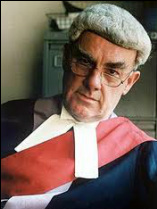
Whenever one hears of the death of a friend, one instinctively knows that life ‘as we know it’ will never be quite the same. When that news comes a week before Christmas, it always seems to come heavier on the heart. On December 18th, 2010, my friend Judge James Pickles died aged 85 years. James lived his life as a man who was greatly misunderstood; especially by those unfortunate defendants in our court-sentencing system whose offence merited the consideration of a custodial sentence. And yet, in truth he was far more radical and in tune with the times he lived in than the rest of the judicial dinosaurs that surrounded him!
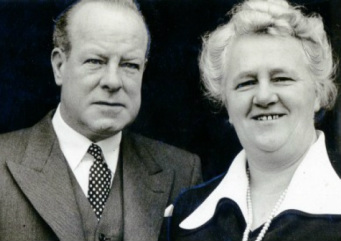
Born in Yorkshire in 1925, this son of a former Lord Mayor of Halifax seemed destined for great things from the outset. Privately educated, he practised as a barrister between 1949-1976, served as a Recorder to the Court between 1972-1976 and was appointed a Circuit Judge in 1975. Before very long into his career as a circuit judge, he started to display his liking for publicity, despite having been schooled to do the opposite. As he put it once when we were talking about the press in general, "The Lord Chancellor believes that neither nuns nor judges were placed on this earth to court publicity, but there are a number of things where our views cross in opposite directions."
Yet courting publicity was certainly something both he and I often did, and to the chagrin of our peers. Judge Pickles frequently expressed his views openly upon the laws of the land and shamelessly advocated that the use of cannabis, along with the practice of prostitution should be legalised.
Yet courting publicity was certainly something both he and I often did, and to the chagrin of our peers. Judge Pickles frequently expressed his views openly upon the laws of the land and shamelessly advocated that the use of cannabis, along with the practice of prostitution should be legalised.
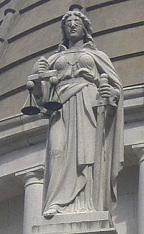
With regard to his own views on the dispensation of 'appropriate justice', woe betide any burglar of private property who ever came before him for sentencing. I am personally aware of so many occasions when His Lordship sat in the Huddersfield Crown Court as circuit judge, how both barristers and defendants would go to almost any lengths to avoid him. Both barrister and defendant would do all in their power to get their case re-listed before another judge, and ajourned to a date when Judge Pickles was dispensing justice in another Shire. As it was down to the Chief Clerk to the Justices to allocate some of the hearing slots, he was the one person along with Judge Pickles that people crossed at their peril.
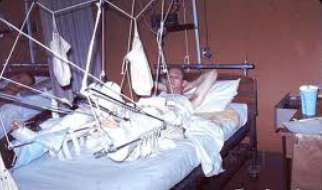
In their attempts to avoid having one's case heard before 'The hanging Judge' (as he was to become colloquially known), defendants would 'go sick', absond, break their bail terms and leave the country or even arrange for another inmate to 'break their arm or leg' while they were on remand in Armley Prison so that they might be hospitalised and have their hearing postponed until a later day.Whenever Judge Pickles suspected such means at play he would deliberately reserve the case to be listed beforer himself.

I even recall one situation where sentence was adjourned by Judge Pickles to obtain Social Enquiry Reports on the defendant by the Probation Service. Not that the learned judge thought such reports to be worthwhile as he clearly stated many times that mostly they weren't. However, such an adjournment and request by the judge was mandatory where a custodial sentence seemed inevitable. One week before the day of sentence, the defendant's wife ensured that her expected pregnancy had been advanced, so that by the time her partner appeared before Judge Pickles for sentence, the defendant had in the meantime become a proud father. This significant change of circumstances represented a completely new situation that his barrister argued (tongue-in-cheek), would stop him reoffending. Even Judge Pickles didn't have the heart to send the new father to prison under the changed circumstances, but specifically suspended a prison sentence and reserved the right to re-sentence personally should the defendant breach the terms of walking free from the court.
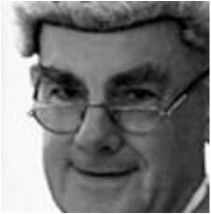
Now, I know that some of the more sceptical amongst you will be wondering how a poorly-educated, materially-deprived mother-to-be from Huddersfield could advance her child's delivery accordingly. The answer is quite simple. During the course of the next week, the woman fell down some steps at home three times; a fact that the learned judge never learned of and one that the reporting probation officer omitted from his report as being of any material significance to the sentencing process if a custodial sentence was to be avoided.

It was taken for granted that all burglars, rapists, child molesters, perjurers and assaults upon a police constable appearing before Judge James Pickles for sentence would instantly go to jail. The only issue for their barrister to argue before Judge Pickles was for 'how long?' He was one of the few judges that I came across during my career where the likelihood of a defendant receiving a longer prison sentence upon appeal of a previous sentence passed by the Magistrate's Court was greater rather than lesser!
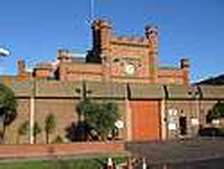
When however, Judge Pivckles imprisoned a single mother of a ten-week-old child to six months for an offence of theft, it hit the national press. He became notorious in the eyes of many and a Godsend to the news hacks. That prison sentence was eventually substituted with a Probation Order; a fact that probably led to his view that most Probation Orders were no more than 'a little better' than a 'let off'. I still recall the time when he lost his patience with a young woman who had been assaulted by her boyfriend. When the boyfriend eventually came before the Court on the Assault charge, his girlfriend (the victim of the offence), got very frightened and refused to give evidence against him for fear of reprisal. In response, Judge Pickles sentenced her to prison for a term of 7 days for contempt of court.

His family included his uncle Wilfred Pickles, the famous comedian and presenter of the radio show 'Have a go Joe'. In more recent times, his daughter Carolyn also made her mark across the nations screens when she starred as a regular in the television series of 'The Bill'. I once asked him if he'd ever considered going into show business himself and his short reply was,"Didn't I?"

Friends come to us in many different forms and while it is more common that the initial contact begins with some mutually pleasurable aspect of contact between the parties, it isn’t always so. Sometimes they experience an initial conflict, which more often than not reflects a 'clash of personalities' between the two people as opposed to a divergence of personal values. Just as an extremely close friend can become the fiercest of enemies under certain circumstances, then so it is that a hostile contact can occasionally become the best of friends. While the judge was never really my enemy (we were too close in character and certain values for this to have ever been so), we did get off to a somewhat rocky start!
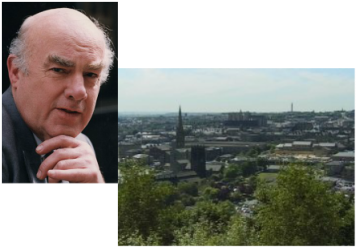
When Judge James Pickles died a while ago, I knew that someone special in my life had passed away. We both emerged on the Huddersfield judicial scene in 1971-1972; he as a Recorder to the Crown Court and me as a young probation officer just out of training and still on my probationary year; yet determined to change the world. We each had what we then saw as widely differing roles. With the exception of murderers, rapists and child molesters,(all of whom deserve lengthy prison sentences in my view), mine was to keep offenders out of prison whenever possible. Barring minor thefts under £10, Breach of the Peace or Drunk and Disorderly offenders, by and large Judge Pickles' perceived role seemed to be to fill the prisons back up!

It was only a matter of time therefore before the two rebels to their profession crossed swords in open court. During the early 70s we were both establishing a reputation with the press and our respective peers for 'doing things our own way'. I was effectively refusing to work within the Probation Service in the manner that I'd been trained to do while Judge Pickles was frequently being hauled over the coals by the Lord Chancellor because of his public pronouncements and harsh sentencing terms imposed upon convicted offenders. The major difference between us, however, was one of rank within the heirachy of the judicial process. He was 'Judge to the Court' and I was the lowly probation officer, described in the training manual as being a 'servant of the Court'. Hence, the scales of justice were never equally balanced and were clearly weighed in favour of His Lordship's role.

In those days, most probation officers were encouraged to believe their role to be as 'advisor' to the sentencing court and not 'recommender'. Indeed, the view was generally held that probation officers 'never' made recommendations in their Social Inquiry Reports to the sentencing court. We were effectively expected to behave not too differently from that of 'the three wise monkeys' who 'hear all, see all but say nowt!'

I was however one of those 'rebel' officers who was constantly arguing for change within the judicial system. Never being one to deliberately waste my time on anything I ever did, I could see no point in being requested by the judge to prepare a factual report on the defendant to enable the most appropriate sentence to be passed, particularly if the sentencing judge took no notice the overall view of its author. Hence, I always made my views in reports explicitly known to the judge. Such radical practice was frowned upon by most judges and was tolerated by a few. Unlike, the statue of Harold Wilson outside the Huddersfield railway station, which Judge Pickles later told me that he admired, there was no way that I intended to put my pipe back in my mouth and bite on it when I'd something to say!
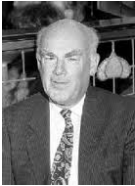
Right from the off, I believe that my Senior Officer, Wilf Batty, realised that he was in for a rough ride if he was ever to ‘break me in’ adequately enough to pass my probationary year before I’d be confirmed in my post as suitable. I was determined that Judge James Pickles wasn't going to scare me off my principles if I could prevent it. He may have looked stern in his wig and gown sitting majestically above the rest of the court, but I always felt less threatened and intimidated by him by my simply ploy of viewing him primarily as being Wilfred and Mable Pickles' little nephew.
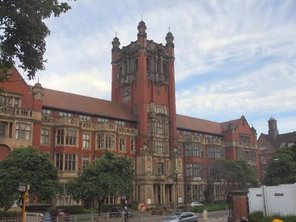
Let me say here and now, that the intake of Newcastle Polytechnic College students in 1970/71 was extremely radical in their views. It was undoubtedly a year of ‘movers and shakers’. Most of the students who passed through the C.Q.S.W. course (Certificate and Qualification in Social Work) that year intended to hold the position of Chief Probation Officer within a matter of ten years. Some intended to reform the penal system root and branch while a few hopeless idealists even hoped to help the type of offender who clearly didn’t want to be helped!

Armed only with my C.Q.S.W. and a belief that the time for change was ripe, I set about my task for moving society into the modern age of ‘enlightenment’. Within a short matter of time, I was quickly making a name for myself; invariably for the wrong reasons as far as the judiciary was concerned.
I saw little point in preparing reports for the sentencing court if I was restrained from ‘recommending’ an eminently appropriate sentence to the Judge where I believed one existed, as opposed to mere ‘advising’. So whenever a particular sentence of court appeared to be more appropriate than an alternative sentence being considered by the judge might be, I simply said so in unequivocal terms.You must remember that the early 70s saw mass protest demonstrations in favour of ban the bomb, gay rights, womens' lib protests, black power, civil rights' protests, free Nelson Mandela and all manner of other causes. The 70s was not the time for 'putting up' with the status quo any more or 'shutting up' where protest was needed. Most young people saw it as a time for change!
I saw little point in preparing reports for the sentencing court if I was restrained from ‘recommending’ an eminently appropriate sentence to the Judge where I believed one existed, as opposed to mere ‘advising’. So whenever a particular sentence of court appeared to be more appropriate than an alternative sentence being considered by the judge might be, I simply said so in unequivocal terms.You must remember that the early 70s saw mass protest demonstrations in favour of ban the bomb, gay rights, womens' lib protests, black power, civil rights' protests, free Nelson Mandela and all manner of other causes. The 70s was not the time for 'putting up' with the status quo any more or 'shutting up' where protest was needed. Most young people saw it as a time for change!
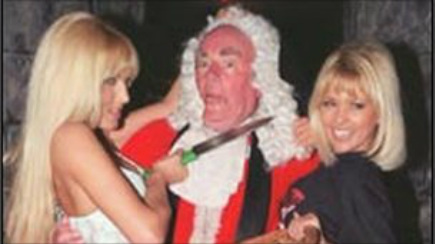
Around this same time, Judge Pickles was quickly stamping his authority on every situation he was a part of. He even ignored the Lord Chancellor and continued to make himself available to appear on all manner of television programmes, thereby breaking with judicial convention that judges did not appear on television or give interviews to the press in a personal capacity that might demean their position in society or bring the law of the land into disrepute. There was never a week when his sentences imposed upon convicted defendants didn’t provide copious copy for the media or provoke controversy or appeal.
On that fatal day we crossed swords in his court. I had prepared a Social Inquiry Report on a man who had been remanded in custody by Judge Pickles for an offence of ‘Theft of Electricity’. At the time of the defendant’s remand in custody hearing, Judge Pickles had warned the man to ‘be prepared to receive a prison sentence when he returned to court, after the preparation of Social Inquiry Reports'. I recall thinking at the time, "Why bother with a Social Inquiry Report, Judge? Just have him back, give him a long sentence and throw away the key!"

By the time that the defendant had been returned to court for sentencing, I’d interviewed him on four occasions and had arrived at some meaningful appraisal that surrounded the offence. I had learned that the defendant was a married man and the father of three children; each child was under the age of 5 years of age. He had been unemployed for around two years, having been made redundant from a job he’d held for four years. Meanwhile, he had become heavily indebted and survived with his wife in a council sub-standard property. At the time of the offence, his 1-year-old infant had a bad dose of flu. It was during the height of a bad winter and it was bitterly cold and snowing on the night of the offence. The electricity and gas had been previously disconnected as a result of non-payment.

On the night of the offence, the flu-stricken baby was reportedly crying non-stop, the mother of the child was despairing and the defendant was on the edge of cracking up. So he illegally connected his property to that of his next door neighbour’s gas and electricity supply to provide the family with some heat and light. Such illegal connection of gas and electric supply, along with starting up a motor car without a set of keys in the ignition is common knowledge within many of the poorer neighbourhoods. With regard to any previous convictions the defendant had, they amounted to two minor theft charges within the preceeding ten years as a teenager.

On the day that the defendant was due to be sentenced, I attended Crown Court with him and presented the Social Inquiry Reports that I’d prepared. The conclusion of the report was not couched in ‘advisory’ terminology, but carried the unequivocal statement and my ‘recommendation’ that the defendant did not deserve to go to prison, but should be made the subject of a Probation Order that would allow him and family to be helped. Believing me to be usurping his position on the Bench, Judge Pickles instructed me to enter the witness box and to justify my report to his satisfaction. With some trepidation I went into the witness box to face this judicial juggernaut.
After some disagreement between us as to the proper function of a probation officer when preparing reports for court, Judge Pickles, who was not accustomed to ever being crossed in open court asked, “Since you obviously feel that you have established a rapport with the defendant, Mr Forde, how do you suggest that the court can best help him stop offending?”
After some disagreement between us as to the proper function of a probation officer when preparing reports for court, Judge Pickles, who was not accustomed to ever being crossed in open court asked, “Since you obviously feel that you have established a rapport with the defendant, Mr Forde, how do you suggest that the court can best help him stop offending?”

I replied, “Unless the court is able to reconnect his electricity and gas supply, obtain him a job, get his creditors off his back and help him and his family to be re-housed, I’m afraid that the court cannot help him, Your Honour.”

Having considered my response to the court as being flippant and unacceptable, especially coming from a relatively inexperienced probation officer who was not long out of training, Judge Pickles decided that I should spend the remainder of that afternoon ‘in the police cells’ beneath the court complex to reflect upon my contribution to the sentencing process which he viewed as having bordered on ‘contempt of court’.
While this was a most unusal course of action for a sentencing judge to take and one which got us both mentioned in the local press, it was nevertheless the start of a very long relationship between us in our resctive roles within the judicial system. I think I was the only probation officer to have been so sentenced by him over the course of his lengthy career.
When I eventually emerged from the police cells later that afternoon, I learned that the defendant had indeed been given a three year Probation Order by Judge Pickles and had not even been fined. It was specified by the learned judge that I should be his supervising officer during this period.
While this was a most unusal course of action for a sentencing judge to take and one which got us both mentioned in the local press, it was nevertheless the start of a very long relationship between us in our resctive roles within the judicial system. I think I was the only probation officer to have been so sentenced by him over the course of his lengthy career.
When I eventually emerged from the police cells later that afternoon, I learned that the defendant had indeed been given a three year Probation Order by Judge Pickles and had not even been fined. It was specified by the learned judge that I should be his supervising officer during this period.

During subsequent years of working as a probation officer in the Huddersfield court jurisdiction, His Honour Judge James Pickles and I developed a marked respect for each other. I’d even go as far as to say we were very much alike in many ways. We each courted the press and were both mavericks within our respective professions. Neither of us were born to take orders from another and we both loved reading books and writing them. Little did I know it at the time, but we both were destined to finish up with a wife called 'Sheila' as our better halves.

Between 1990 and 2000, I wrote many books for children and visited over 2,000 Yorkshire Schools where my books would be publicly read to assembled children by celebrated names and famous people. I called upon the services of my friend, Judge Pickles on no fewer than five occasions to perform this role and each occasion he was happy to oblige. To His Honour’s surprise and no doubt the surprise of the press and media, he was ‘a natural’ when it came to engaging with children. It always made me smile to hear and observe his deliberate childlike mannerisms whenever he acted as a storyteller in one of our primary schools.
He once told me after the second time he read for me that, "Next to the sheer thrill I get from driving my sports car across the Dales on a summer's day with the wind blowing in my face, being in the presence of children gives me the greatest joy." I got the distinct impression that he held some regrets and had he been able to wind back the clock, he would have chosen to have spent more time with his own children during their earlier years of growing up.
He once told me after the second time he read for me that, "Next to the sheer thrill I get from driving my sports car across the Dales on a summer's day with the wind blowing in my face, being in the presence of children gives me the greatest joy." I got the distinct impression that he held some regrets and had he been able to wind back the clock, he would have chosen to have spent more time with his own children during their earlier years of growing up.

To see such naturalness with small children and to experience first-hand his obvious pleasure was to witness a side of this truly good man that he rarely allowed the wider world to see or know about. We may have started our relationship as adversaries and displaying a clear personality conflict between us, but we became good friends over the years ahead.
It could even be said that long before Prime Minister David Campbell had said to President Barack Obama, 'We're all in this together', the Judge and I had already established our own loose alliance.
I remember when I was awarded an MBE, that he was the very first person to call and congratulate me, followed by a letter of congratulations from his daughter, Carolyn Pickles (of ‘The Bill’ TV fame), the following day.
It could even be said that long before Prime Minister David Campbell had said to President Barack Obama, 'We're all in this together', the Judge and I had already established our own loose alliance.
I remember when I was awarded an MBE, that he was the very first person to call and congratulate me, followed by a letter of congratulations from his daughter, Carolyn Pickles (of ‘The Bill’ TV fame), the following day.
God bless you, Judge James. I only hope that you are allowed to take your sports car with you into the after life. I know how much you enjoyed driving it across the Yorkshire Dales whenever you got the opportunity to do so and weren't driving the Lord Chancellor crazy trying to predict your next judicial pronouncement. I would dearly love to hear the conversation that transpires between you and St.Peter on the Day of Judgement when you turn up at the Pearly Gates in your sports car and refuse to enter without it. I'd also like to be a fly on the wall and be there to judge your response when final sentence is passed on you by a higher power.
Copyright William Forde, March 2012
Copyright William Forde, March 2012

